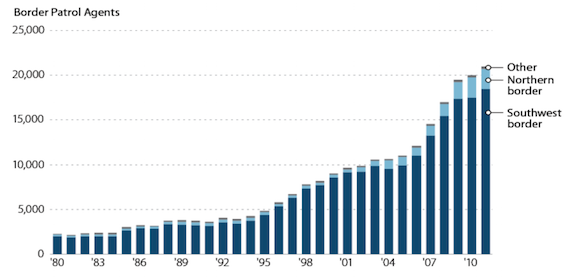While it is impossible to determine Ted Cruz’s true motivations, his sterling educational pedigree suggests his most horrifically demagogic statements are driven by a cynical quest for power. But at Tuesday’s Republican debate, Cruz displayed what must have been sincere confusion when he attacked Marco Rubio’s past support for “amnesty” by citing Ronald Reagan’s decisiveness.
“You know, there was a time for choosing as Reagan put it,” Cruz self-assuredly intoned. “Where there was a battle over amnesty and some chose, like Senator Rubio, to stand with Barack Obama and Chuck Schumer and support a massive amnesty plan.”
Is it possible that Cruz, the son of a Cuban refugee, is not aware that in 1986, Reagan signed the Immigration Reform and Control Act, which ultimately legalized the status of 2.7 million people? That wasn’t the only odd statement on immigration, which along with terrorism, and immigrant would-be terrorists, dominated much of the debate.
Defending his plan to “enforce the law” against immigrants, Cruz cited Bill Clinton’s administration.
“Do you know how many aliens Bill Clinton deported?” he asked. “12 million. Do you know how many illegal aliens, George W. Bush deported? 10 million.”
In fact, Bill Clinton forcefully deported, or removed, just about 681,000 immigrants. Another 9.7 million in the fiscal years covering his presidency were subject to “voluntary returns,” meaning by and large that they were turned back at the border. Cruz’s misleading statement, however, is a reminder of a greater truth that both Republicans and Hillary Clinton are doing their best to obscure: Both parties, in recent decades, have often had a pretty horrible record on immigrant rights.
In 1996, President Clinton signed the Illegal Immigration Reform and Immigrant Responsibility Act (IIRIRA), which, among other things, allowed for the automatic removal of many undocumented immigrants without judicial review, mandated further increases in the size of the Border Patrol, and authorized the use of local police to enforce immigration law.
“The simple fact is that we must not and we will not surrender our borders to those who wish to exploit our history of compassion and justice,” Clinton proclaimed in 1993—at the very moment he was preparing to open the border wide to business under NAFTA.
The militarization of the border under Clinton—including major Border Patrol deployments to the El Paso and San Diego areas in Operations Hold the Line and Gatekeeper—wreaked havoc in binational communities from Texas to California and caused a huge number of migrants forced to cross through dangerous desert climes to die.
Deaths along the Southwest Border rose from 263 in 1998 to 380 in 2000, 454 in 2006 and 471 in 2012, according to Border Patrol. Their number of agents grew from 4,139 agents in fiscal year 1992 to 9,212 in 2000 and 21,444 in 2011.
It “created,” as Asian Americans Advancing Justice – Asian Law Caucus attorney Anoop Prasad emailed, “the enormous immigration detention system that we have today and expanded deportation grounds for Lawful Permanent Residents with criminal convictions.”
Democratic support for border militarization, says University of California, San Diego sociologist David FitzGerald, was a “response to prop 187 in California,” a measure that would have denied public services, including education, to undocumented immigrants if it hadn’t been blocked by the judiciary. Clinton was worried “that the unauthorized immigrant issue was just getting out of control and would come back and reflect poorly on the Democrats.”
It was Reagan’s IRCA, however, that first laid the foundations for future border militarization and mass deportation. The measure increased the size of the Border Patrol by 50 percent. It also created sanctions for employers who knowingly hired unauthorized workers. Rather than dissuading employers from hiring the undocumented, the measure, according to the Migration Policy Institute, gave bosses leverage to use their employees’ legal status against them.
Reagan’s successors from both major parties doubled down.
On immigration, George W. Bush was an ally of the Republican business class. He favored legalizing the status of big business’ undocumented workers and creating a guest worker program to provide them with a flow of second-class noncitizen labor. And he dramatically stepped up deportations to placate immigration critics on the right.
That, of course, didn’t work: The right-wing, on immigration as on most any issue, cannot be placated.
A Senate measure combining legalization and enforcement passed in 2006. House Republicans passed the Border Protection, Antiterrorism, and Illegal Immigration Control Act of 2005, the so-called Sensenbrenner bill, which would have amongst other harsh enforcement measures criminalized unauthorized presence in the country. It also sparked enormous largest immigrant rights protests. Neither the Senate bill nor Sensenbrenner’s made it out of Congress.
Another “comprehensive” measure failed to pass out of the Senate in 2007.
What did pass, in 2006, was the Secure Fence Act, mandating “at least two layers of reinforced fencing, installation of additional physical barriers, roads, lighting, cameras, and sensors extending” across at least 700 miles of the 1,969-mile border with Mexico, according to the Washington Office on Latin America.
It received support from Democrats like then-Senator Hillary Clinton. (It was opposed by then-Rep. Bernie Sanders.) The fencing was never completed, according to WOLA, because its price tag would have reached an estimated $4.1 billion.
After taking office President Obama mostly emulated Bush’s approach, offering increased deportation and border militarization in a fruitless effort to win conservatives over.
Obama presided over a record number of deportations and the mass conversion of local law enforcement into immigration agents through the Secure Communities program. This was all ostensibly intended to serve the greater purpose of demonstrating enough enforcement bona fides to conservatives that they would be enticed to support so-called “comprehensive” immigration reform, which would include a “path to citizenship” for undocumented people.
Obama, says FitzGerald, was “hoping that by ramping up deportations to record levels he could show that he was tough on this issue” and “get some space to push through a grand bargain including legalization.”
Obama’s security measures worked, however, only in the direct sense that they resulted in mass deportations. They entirely failed to mollify anti-immigrant conservatives whose hostility toward anything smelling of “amnesty” remained firmly in place.
“The hardliners on this issue will never accept that they’ve been given enough,” says FitzGerald. In part, that’s because they have been shown again and again that the bipartisan establishment will provide more enforcement without actually ensuring any legalization in exchange.
The result has been decades of largely bipartisan support for intense border militarization and mass deportations without any of the legal status that Democrats and establishment conservatives craved. Today, border militarization remains a subject that is rarely discussed amongst Democrats. Republicans just argue for more of it.
Border militarization has received so much support from establishment Democrats that its not portrayed as a “partisan” issue—the sort of issues that are mostly likely to garner media attention. If it’s not an issue that makes a difference in the election horse race or in daily Capitol Hill acrimony, the commentariat doesn’t consider it that interesting.
“The border enforcement policy is not really publicly identified with the Clinton Administration even though obviously that’s when it began,” says FitzGerald.
In the three decades since Reagan signed ICRA, immigration enforcement spending rose from $1.2 billion in 1986 to $18 billion in 2012, according to the Migration Policy Institute.
On the visceral level, the message from Republicans is clear: immigrants are not only coming to take our jobs, they are going to kill us all. Meanwhile, Democrats are positioning themselves as the party of multicultural humanity and inclusiveness. Historically, however, the picture for both parties is not only pretty muddled. Towards immigrants, their policies have been profoundly racist and inhumane.



